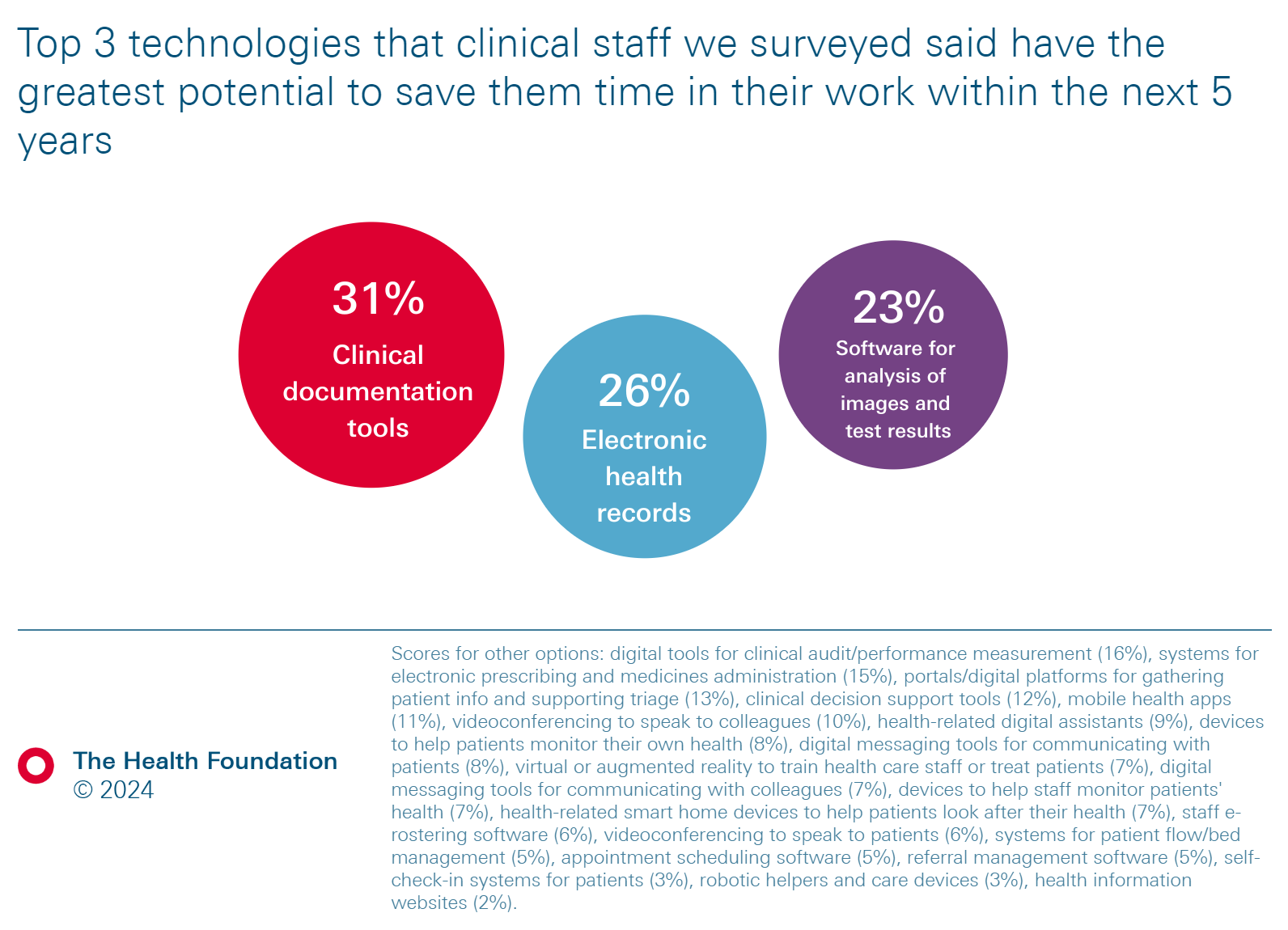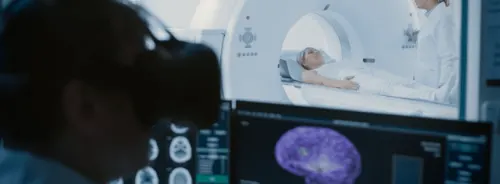The NHS faces significant demand pressures, and technology presents a promising opportunity to alleviate some of these challenges. While it's not a cure-all and requires investment to address workforce shortages, recent advancements, particularly in artificial intelligence, have generated interest in using technology to boost productivity and free up time for patient care. This focus on technology was highlighted in the 2024 Spring Budget and aligns with the NHS Long Term Workforce Plan's goals. The Health Foundation has been exploring clinical staff perspectives on technology's potential through surveys, interviews, and research. Their report emphasises the importance of incorporating clinical insights into the adoption of technology to ensure the successful implementation and transformation of NHS care.
Current Technological Landscape in Healthcare
The survey findings indicate that electronic health records (EHRs) are extensively utilized by healthcare professionals, with 87% of respondents reporting their use. Similarly, videoconferencing for communication with colleagues was prevalent, selected by 86% of respondents, followed closely by digital messaging tools for colleague communication, chosen by 73%. These results suggest the widespread adoption of technologies facilitating staff communication and collaboration.
Conversely, technologies aimed at patient communication, such as videoconferencing and digital messaging tools, were less commonly utilised, with only around one-third of respondents selecting them. More cutting-edge technologies, including virtual or augmented reality for training purposes or robotic helpers for patient care, were used by only a small fraction of respondents, with 3% opting for virtual or augmented reality and just 1% reporting the use of robotic helpers and care devices.

The survey sample primarily comprised professionals working in secondary care, representing nearly 50% of respondents. However, even among those primarily engaged in primary care and community care, the top three technologies remained consistent, indicating their widespread use across various healthcare settings.
Insights on the Time-Saving Effectiveness and Potential of Technology
The survey findings revealed that videoconferencing for colleague communication, EHRs, and digital messaging tools were the top technologies identified by healthcare professionals as saving them the most time compared to non-digital methods. Notably, these technologies remained significant even when analysed as a proportion of those who actually used them. Interviews echoed the importance of these technologies in supporting administrative tasks and inter-professional communication. Despite the emphasis on patient-facing technologies post-COVID-19, tools facilitating staff interaction, such as Microsoft Teams, have received less attention. However, evidence regarding the time-saving effectiveness of EHRs and other clinical technologies is mixed, with implementation effectiveness being a key factor. Although EHRs and inter-professional communication tools are crucial for integrated patient care, concerns persist regarding their effective utilisation, particularly regarding interoperability and data sharing challenges. While the survey focused on clinical staff, further insights from non-clinical staff are necessary, as indicated by the limited responses regarding technologies like self-check-in systems. Overall, there's a greater interest in general-use technologies with broad time-saving potential across the NHS.
Unlocking Efficiency: Exploring Future Technologies in Healthcare
The survey delved into healthcare professionals' perceptions of technologies poised to offer time-saving benefits within the next five years. Among respondents, clinical documentation tools, electronic health records (EHRs), and software for image and test result analysis emerged as the top contenders, highlighting a predominant interest in streamlining administrative tasks rather than clinical procedures.
Despite considerable optimism surrounding the potential of artificial intelligence (AI) to save time, interviewees tempered expectations, citing existing challenges like inadequate IT infrastructure and data quality. Nonetheless, AI-driven innovations such as ambient voice technology for automated transcription of patient consultations and image analysis software showed promise, albeit requiring further development for full realisation.
Notably, studies on automated screening and interpretation demonstrated positive impacts on staff time, particularly in tasks like analysing test results and medical records. However, the evidence base for newer technologies was comparatively limited, with positive findings potentially skewed by publication bias.
In interviews, experts explored the long-term potential of AI to support proactive healthcare models, envisioning scenarios where AI-generated insights could inform early interventions and patient self-management strategies. Such approaches aimed to improve patient outcomes, address health inequalities and alleviate system pressures by reducing demand and creating additional capacity.
Overall, the survey and interviews underscored both the optimism and caution surrounding emerging technologies' time-saving capabilities, emphasising the need for continued research, development, and strategic implementation to realise their full potential in healthcare settings.
Overcoming Barriers to Effective Technology Use in Healthcare
Survey respondents highlighted several key barriers to effectively using technologies in their work. The most commonly cited challenges included a lack of IT support and expertise, insufficient funding for implementation, poor internet connectivity, inadequate equipment, and difficulties with passwords, permissions, or access. These barriers underscored issues related to infrastructure, capability, implementation, and usage.
The importance of context in realising technology benefits was emphasised, with experiences varying significantly across different organisations due to organisational culture and implementation practices. Despite this, concerns or resistance from staff and patients toward technology were among the least cited barriers, suggesting a greater focus on infrastructure and training needs.
Training emerged as a crucial aspect, with concerns over staff's lack of time for training and insufficient training opportunities. Quality issues with NHS-procured technology and the need for improvements in interoperability, user experience, and functionality were also highlighted.
Interviewees emphasised the necessity for rigorous testing, clinician involvement in technology development, and greater alignment of technological solutions with NHS needs and clinical practices. They advocated for a shift towards collaborative technology development with clinicians and patients to ensure relevance and effectiveness.
Roadmap Towards Leveraging Technology for Enhanced Healthcare Delivery
Technology holds significant potential in addressing the challenges faced by the NHS, including demand, workforce shortages, and efficiency. However, realising these benefits necessitates understanding and supporting the needs of frontline clinicians, the wider workforce, patients, and the public. Key areas for action include prioritising technologies that streamline administrative tasks, optimising and spreading existing technologies, and supporting rigorous testing and evaluation of emerging technologies. Additionally, addressing barriers to effective technology implementation and usage, such as improving infrastructure and involving staff in technology development and deployment, is crucial. By engaging with staff perspectives and expertise, policymakers, providers, and industry can identify and implement technology solutions that not only enhance productivity but also improve clinical quality, patient care, and the working environment for NHS staff. This engagement is essential for building consensus and fostering change towards technology-enabled healthcare delivery in the NHS.
Source & Image Credit: The Health Foundation
Title Image Credit: iStock






